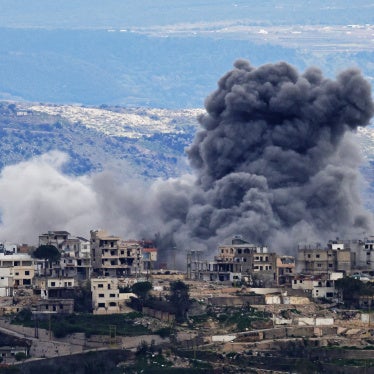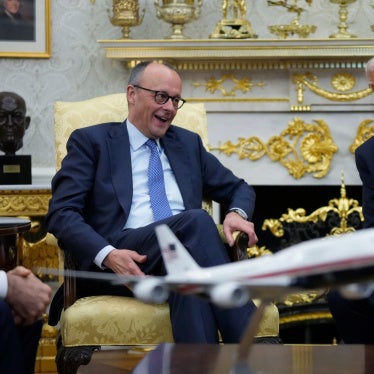(New York) - Egyptian authorities should speedily investigate and bring charges against two plainclothes police officers who numerous witnesses say beat to death 28-year-old Khaled Said in Alexandria on June 6, 2010, Human Rights Watch said today.
Authorities should also investigate their superiors, as well as the local prosecutor whose first investigation failed to properly gather evidence or interview witnesses.
"Witness accounts and the photographs of Khaled Said's mangled face constitute strong evidence that plainclothes security officers beat him in a vicious and public manner," said Joe Stork, deputy Middle East and North Africa director at Human Rights Watch. "All those involved should be speedily interrogated, and the prosecutor should fully investigate what caused the fractures and trauma clearly evident on his body."
Photos of Said's battered and deformed face published on the internet show a fractured skull, dislocated jaw, broken nose, and numerous other signs of trauma. Khaled's brother, Ahmed Said, confirmed the authenticity of the pictures to Human Rights Watch. Nine witnesses came forward to describe the beating.
An initial investigation by the local prosecutor concluded that Said had died of asphyxiation after swallowing a packet of drugs. The prosecutor ordered his body buried. The public prosecutor, a more senior official, ordered a second, higher-level investigation following public protests. But the second forensic medical investigation also said that the cause of death was asphyxiation. Two plainclothes security officials from Sidi Gaber police station who witnesses say beat Khaled to death have not been relieved of their duties and have yet to be questioned by the prosecutor.
Witnesses described to Human Rights Watch how two men who they said were plainclothes officers apprehended Said in the Space Net internet café in Boubaset street. Haitham Misbah, the son of the internet café owner, said he saw the officers beating Said:
Khaled was standing with me just outside the internet café and went in to say hello to a friend. At that point, two policemen in plainclothes, who we later found out had been waiting at the café opposite, went straight up to him and asked for his ID. I saw them grab his arms and hold them behind his back, so I went over to him, but then saw that they had guns and realized they were police. I asked them what they were doing and they said, "Stay out of this or we'll close down your business."
Khaled was struggling. They grabbed his head and banged it against the marble shelf. At this point we tried to get them outside, thinking that they wanted to arrest him, but they dragged him into the entrance of the building next door. Khaled's hair was a bit long, and I saw them grab him by the hair and bang his head against the iron door of the building and hit him in the face and the stomach. They kicked him so hard that he fell on the stairs. They held him by the throat and by the hair and banged his head against the stairs.
The last thing Khaled said was, "I am dying," but they didn't stop. I then heard the wife of the doorman screaming. Khaled has stopped moving, but they continued to kick him, saying, "You're pretending to be dead?"
Mohamed, the doorman of the building next to the internet café, told Human Rights Watch:
I was standing at the top of the stairs in the entrance when they dragged him into the building, holding his hands behind his back. They grabbed him by the hair and banged his head against the iron door of the building and then repeatedly against the marble steps in the entrance. At one point Khaled was gasping "I'm going to die, I'm going to die." They responded saying, "You're dead anyway." They kept beating him although he had stopped moving.
At this point the two policemen phoned an officer saying, "Basha we have a case here." There was a doctor nearby who came in and tried to resuscitate him but couldn't. And then a pharmacist came in and checked and said he was already dead, so we put a sheet over him. The officer arrived with the police van after a bit, and they picked up Khaled's body and put him into the police van. They drove off but came back around ten minutes later and threw his body back into the entrance of the building. Then the ambulance came. The ambulance man didn't want to take the body because he could see he was dead, but the officer ordered him to. There was blood everywhere. I had to clean up the blood.
In the initial investigation, the local Sidi Gaber prosecutor in Alexandria did not visit the scene of the crime and interrogated only two witnesses provided by the police. The witnesses claimed that Said had swallowed a packet of drugs when he saw the policemen. The Said family's lawyer, Mohamed Abd al-Aziz, told Human Rights Watch that the prosecutor ordered a medical examination, which concluded that Said had died of asphyxiation after he swallowed a packet of drugs, and ordered the body to be buried.
When Human Rights Watch raised the case in a meeting with Interior Ministry officials on June 12, they replied that they were still investigating the case and could not comment. However, a ministry news release that day stated, "The truth of the matter is that two members of the Sidi Gaber police station investigations unit... saw Said accompanied by one of his friends, and when the two police officers approached them, Said swallowed a small packet. It subsequently became clear that this packet contained drugs. Said was asphyxiated when he swallowed it, leading to his death."
The statement also claimed that Khaled Said was a "wanted criminal," with two convictions in absentia for theft and illegal possession of weapons, and that he had evaded his military service. Said's uncle, Dr. Ali Kassem, told Human Rights Watch that these allegations were false. Khaled had made several trips out of Egypt, he said, something that would have been impossible if he had not fulfilled his required military service or if there were pending court sentences against him.
"Even if Khaled Said had been wanted in connection with some earlier offense, that does not give license to police to attack and murder him in cold blood," Stork said. "The Interior Ministry statement is grossly irresponsible, implicitly condoning police brutality."
The brutal killing of Said led to demonstrations in Cairo and Alexandria, which security services forcibly dispersed, making numerous arrests.
On June 15, Public Prosecutor Abdelmeguid Mahmoud ordered the investigation reopened and transferred the case to the Alexandria appeals prosecution unit. He ordered officials to exhume the body and appointed three doctors to conduct a new forensic investigation. The prosecutor made public this second forensic medical report, confirming the cause of death as asphyxiation, on June 23. However, the second medical report also said there were a number of injuries on the body and concluded that there was "nothing to prevent the injuries from having occurred as a result of beating during the arrest of the victim."
On the basis of this finding alone, the prosecutor should expedite the interrogation of the two policemen involved and the officer who supervised the operation and should issue warrants for their arrest to carry out the investigation, Human Rights Watch said.
The prosecutor can still refer the case to court under article 129 of the penal code, which states that "public employees or officials, and individuals assigned to a public service who use their position to treat an individual cruelly by comprising honor, causing pain or hurting them, shall be punished by imprisonment for a period of up to a year or by a fine that shall not exceed LE 200."
"The reported forensic findings do not answer one basic question: how Khaled Said's body acquired the shocking signs of a horrific beating, consistent with the accounts of numerous witnesses who said they saw these officers slam Khaled's face repeatedly against a marble steps and an iron door," Stork said. "The public prosecutor needs to carry out a full independent criminal investigation into the behavior of the officers."
After the appeals prosecutor visited the scene of the crime and spoke to people in the area, additional witnesses came forward and testified before the prosecutor that they witnessed the beating. Misbah told Human Rights Watch that initially only he, his father, the doorman of the building next door, and a friend of Khaled's who was standing outside were willing to testify.
He said:
I spent days trying to convince people to go and testify, but everyone was too scared. Especially because after the incident, officers from Sidi Gaber police station came to our area and indirectly threatened to people not to cause trouble. Everyone was scared that the same thing could happen to them if they reported what had happened. People were only reassured after the Alexandria appeals prosecutor came to the area and encouraged people to testify and assured them that he would guarantee their protection.
However, the public prosecutor has yet to summon for interrogation Major Ahmad Osman of the investigations unit at Sidi Gaber police station, who was in charge of the operation, or Lieutenant Colonel Emad Abdelzaher, in addition to the two plainclothes policemen who the witnesses saw beating Said. The Said family lawyer, Mohamed Abdelaziz, confirmed to Human Rights Watch that none of these officers have been suspended and that they are still working at the police station.
The European Court of Human Rights recently reiterated the international legal position that in cases of ill-treatment and torture, officers under investigation should normally be suspended during the disciplinary inquiry and dismissed if found responsible for such acts.
The United Nations Basic Principles on the Use of Force and Firearms by Law Enforcement Officials state that law enforcement officials may only use violent means if unavoidable and must "exercise restraint in such use and act in proportion to the seriousness of the offence," as well as "minimize damage and injury, and respect and preserve human life."







